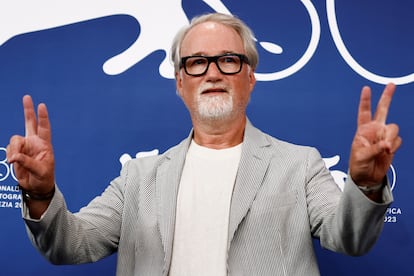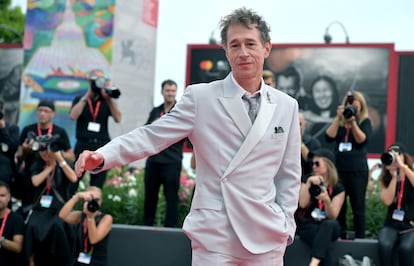Under the direction of David Fincher, Michael Fassbender kills in style
‘The Killer’ slays the Venice Film Festival with the revenge of a professional killer and his first doubts. ‘The Beast’ and ‘The Theory of Everything’ round out a great day at the Mostra

The assassin’s job is complex. Not so much because of the climax; that happens fast, and it is practically the least important. The hard part comes before and after the murder: the days of waiting, the McDonald’s hamburgers, the stretching, the concentration. And, once the work is done, there’s the need to disappear, the planes, the hotels, the change of identity. Exhausting, but essential tasks. On screen, he says it himself: you don’t need to be a genius, the quality that counts is “detachment.” Only a rigid plan and even more granular certainties allow for lowering one’s heart rate to 60 beats per second when it is required, and for pulling the trigger with exact precision. One must always be on target. Watch. Wait. Breathe. Breathe.
David Fincher is back with two hours of adrenaline, psychology and anguish. So is Michael Fassbender, who appears in practically every shot of The Killer, which premiered on Sunday at the Venice Film Festival. As icy and implacable as its main character, the film barely gives the audience any respite. And it aims straight for the competition’s awards. The movie also resembles its character in another aspect: not even the most perfect method can save it from doubts. There is little time left to reach a personal verdict now: the movie will be released in select theaters in October and then debut on Netflix on November 10.
From nightmare to fascination
Fincher first visited the Venice Film Festival in 1999. Back then, he was premiering Fight Club, and the movie was panned. At the time, Fincher had an extensive background in music videos, but he was just beginning to find himself in cinema. Alien 3, his debut in 1992, had turned out to be “a nightmare,” as Fincher himself described it; he was frustrated by battles over the budget and fighting with executives and suits and ties. But few filmmakers can boast that their second film is a masterpiece like Seven. Then came Zodiac, Gone Girl and Mindhunter. Fincher acquired the status of one of the most fascinating artists in contemporary cinema. That’s reason enough to generate high expectations at the Venice Film Festival competition. Moreover, Lido was given the opportunity to correct its misunderstanding of Fight Club at the turn of the millennium. By the way, the feature film they hated so much in Venice went on to become a cult favorite.
“The Killer is a very simple, attractive and direct drama,” the filmmaker told the press. Its star Michael Fassbender could not be there, due to the actors’ and screenwriters’ strike against the big studios and Hollywood platforms. Fincher said that he was “sad” about the stoppage; he added that he understood “both sides” and encouraged them to “talk.” For the same reason, Andrew Kevin Walker, the writer of this feature film (which was based on Marz and Luc Jacamon’s comic book of the same name) and Seven could not attend either. The director answered questions for them. But above all, the screen did the talking. The Killer continues Fincher’s grim journey into the minds of those who kill. His camera has studied the horror, the reasons, the impulses. Now, Fincher seeks to peer into the protagonist’s brain and look at an intruder: his conscience.
“I didn’t really think of the movie as an assassin movie, I think of it more as a revenge movie… The schism between his mantra, the words that he lives by, and his behavior that is forced to adjust, was ultimately where the movie exists, where the character exists,” Fincher said. Through that gap, emotions, a thirst for revenge and hesitation begin to creep in. Such an impenetrable mental fortress thus threatens to turn into a house of cards. The killer’s armed to the teeth but stripped of his main defense: coldness.
The deadliest and most elusive
At this point, Fincher does not lack ammunition either. His new film is another impeccable artifact: camera, photography, soundtrack, editing, dialogues and performances combine to keep viewers on the edge of their seats (and to deter any thought of moving). A film student seeking to learn how to create tension can go through the movie’s first 20 minutes, although additional master classes—that dinner... —are scattered throughout the film. The movie also provides a rarely seen portrait of the killer’s day-to-day life, including warehouses in several U.S. states, dozens of license plates, even more passports. The deadliest, most elusive professional assassin even uses Amazon’s fast shipping, when necessary. All potential risks and needs must be anticipated before they happen. “Anticipate, don’t improvise,” the main character repeats to shore up crumbling security.
Everything is electric. There is, perhaps, only one weakness: the one with which the script infects the protagonist. “We wanted somebody who didn’t need to be frightening, [he’s] the mundanity of evil. My hope is that someone will see this film and get very nervous about the person behind them in line at Home Depot,” Fincher stated. The film does elect to show that a spark burns within the Iceman, but too little of it to attempt to sustain part of the plot with it. The hazy motivation somewhat damages the killer’s journey. But it does not mortally wound it. Nor does it prevent this movie from being among the best films at this Venice Film Festival.

Two other films presented at the competition on Sunday are also among the best offerings. They came with fewer expectations surrounding them but are confident in their strength: ideas. Bertrand Bonello’s The Beast displays quite a few, to such an extent that we must add the viewer’s period of reflection to the movie’s running time of two hours and 20 minutes. At the press conference, the filmmaker pointed out that, ultimately, his characters speak of simple feelings, especially love. But they do so during three different moments in time, between period costumes and science fiction, amid reflections on artificial intelligence, DNA and the frontiers of a relationship. The movie is inspired by Henry James’s novella The Beast in the Jungle, but very freely and, of course, more ambitiously. The camerawork is similarly ambitious; it is dedicated to serving the story with the most creative and appropriate resource for each sequence. Léa Seydoux appears in all of the scenes and shows why many consider her to be an acting prodigy.
On the other hand, Timm Kröger is virtually unknown outside Germany. “He will be the major surprise,” the Venice Film Festival’s artistic director Alberto Barbera proclaimed when he opened the festival. That’s a bit much, perhaps. Nevertheless, The Theory of Everything was the least expected—and therefore maybe the most welcome – of the festival’s best films. It’s surely a notch below the others, but it is only the director’s second feature film. Suddenly, in a competition that, until now, has very much been tied to the canon, a vaporetto full of creativity arrived. Kröger also draws from the classics, but he has created something very peculiar: who would have thought that the format of the great spy and intrigue cinema would also serve to talk about the multiverse? The German summed it up as follows: “It’s sort of as if Hitchcock and Lynch, and many others, known or forgotten, made love on the carpet of an old hotel lobby.” What a parallel world. It’s well worth a visit.
Sign up for our weekly newsletter to get more English-language news coverage from EL PAÍS USA Edition
Tu suscripción se está usando en otro dispositivo
¿Quieres añadir otro usuario a tu suscripción?
Si continúas leyendo en este dispositivo, no se podrá leer en el otro.
FlechaTu suscripción se está usando en otro dispositivo y solo puedes acceder a EL PAÍS desde un dispositivo a la vez.
Si quieres compartir tu cuenta, cambia tu suscripción a la modalidad Premium, así podrás añadir otro usuario. Cada uno accederá con su propia cuenta de email, lo que os permitirá personalizar vuestra experiencia en EL PAÍS.
¿Tienes una suscripción de empresa? Accede aquí para contratar más cuentas.
En el caso de no saber quién está usando tu cuenta, te recomendamos cambiar tu contraseña aquí.
Si decides continuar compartiendo tu cuenta, este mensaje se mostrará en tu dispositivo y en el de la otra persona que está usando tu cuenta de forma indefinida, afectando a tu experiencia de lectura. Puedes consultar aquí los términos y condiciones de la suscripción digital.









































